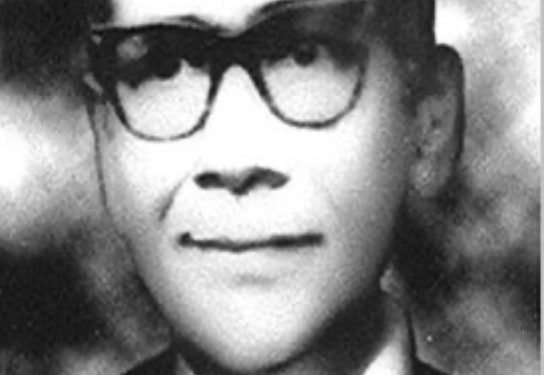– Razia Begum
Some men make history and some create circumstances that lead to it. Syed Mahbub Murshed was a man that combined both these factors. He was a man with a vision and mission. Therefore, primarily historians will always take note of Justice Murshed for his bold and courageous judgments, which became a thorn in the flesh of the dictatorship of the Field marshal Ayub Khan and his Basic Democracy government. When no one seemed there to defend our national pride and our identity, it was only Murshed stood up and stood tall. He championed the cause of the Bengali people.
For these high principles of patriotism, Murshed is “living history.” Why I state this, I will explain following paragraphs. However, I would like discuss his life and times into two parts Murshed as a judge and Murshed as a man Firstly as a Justice, whether as a High Court judge or being briefly in the Supreme Court and later as Chief Justice, he had fearlessly upheld the rule of law despite major obstacles from the highest political offices of the times.
For his bold noteworthy mainly constitutional judicial pronouncements Justice Murshed had not only established himself in the national focus but also the prevailing international recognition for being independent and fearless. In many ways he was indeed the people’s justice.
K Salahuddin writes “As a judge, Mahbub Murshed remained committed to his lifelong ideals of liberty, justice and excellence.” Another writer states “the late Chief Justice Syed Mahbub Murshed was arguably the most distinguished constitutional lawyer and the most eminent jurist that our South Asian sub-continent has ever seen.
He was indisputably, in our part of the world most articulate advocate of human rights and the most eloquent civil libertarian. Not only did Syed Mahbub Murshed discharge his duty to the nation with outstanding competence, he also set the high standard for all professionals to emulate.”
To site a few examples from his judgments, Justice Murshed was first to strike the teeth of the Martial Law government in 1959 when he declared the EPDO null and void as this debarred many leading politicians. In the Ministers case, he unseated Ministers. To quote Justice Murshed, “It is not the abuse of power that the Courts are meant to readdress.
” In the Abu Mahmud case summons were given to the Governor Mr Monem Khan and a Court commission was constituted. That is when Justice Murshed told the Governors defending lawyer “tell the Governor my Court is a temple of justice and not a chamber of horrors.” Such was his exemplary Courage. In one of Justice Murshed early judgments, which was in the “Pan case,” it remains accordingly to international jurists as one of finest treatise in legal history.
To move on to second part of my article is a short sketch of Murshed as a man. He hailed from the most aristocratic family. His father was the first Divisional Commissioner of Bengal. His mother was the younger sister of the Shera Bangla. He was married to the only child Mr Zakariah a famous Mayor of the then Calcutta. Syed Mahbub Murshed was also a brilliant student all throughout whether it was her school final or at Presidency College or Calcutta University and all this culminated in finally becoming a barrister in Lincoln Inn London. From his youth he was outstanding.
He first came to by the article he wrote in 1942 published simultaneously in the ‘Statesman’ Calcutta and the ‘Guardian’ defending his Uncle Mr Fazlul Haq was thought provoking with the intelligencia. The humanist in Murshed led him to form the ‘Anjuman Mufidul-Islam’ which rendered valuable service in the Bengal famine and the communal riots in in 1946. Later in the fifties he was in addition to a Judge Chairman of the Red Cross plus participated in many socio-economic causes throughout his life.
Murshed with his uncle the Shera- Bangla along with others in January 1948 stood up and said no! No! No! When Mr Jinnah said that “Urdu and Urdu alone would be the state language.” However, he turned briefly to Calcutta and Murshed became one of the men who were responsible for “Liaqat-Nehru” pact which aimed to end communalism in the Sub-continent. Upon return to Dhaka He started to participate in the Language Movement.
On the 21st of February 1953 after attending the Janaza of the Martyred heroes Murshed along with his Uncle the Shera Bangla joined the procession which was Lathi charged and both Uncle and Nephew were held by the Police for a few hours. Justice Murshed believed in Cultural freedom. He in 1961 organised the Tagore Centenary all over the country despite the opposition from the highest quarters in the state. A powerful orator Murshed would hold his audience “captivated and spell-bound.”
In early 1954, Murshed along with Abul Mansoor Ahmed drafted the historic 21points led by his Uncle which led to the land slide victory of the then Jukta front Government. More than a decade later as Chief Justice because of his immense patriotism in early 1966 by putting the final touches to another historic six points which was the matter Sk Mujib fought and was jailed for.
In the same year many now very senior Chatra leaguers recall that it was only Chief Justice Murshed who dared to attend as chief guest in their annual conference. It was there where Murshed along with the jailed Sk Mujib gave the courageous and heroic call for provincial autonomy.
At the very end of 1967 Murshed resigned from the post of Chief Justice. Among the first thing that he had done was to organise the defence of the Agartala Conspiracy case. By this time Syed Mahbub Murshed seemed to be the only acceptable Presentable candidate to contest against President Ayub Khan. He joined the mass upsurge in late 1969-69 and it was largely because of him that Sk Mujib came out without payroll and all fellow accused came out exonerated.
Presiding over a secession of the historic Round Table Conference with the breakup of one unit in the western wing Murshed proposed one man one vote which got accepted. Because of this the eastern wing got 169 seats in eastern wing out of 300 in the National Parliament. Prior to this there was parity of 150 each in both wing but since Murshed’s one man one vote proposal got acceptance whoever would get majority seats would form government.
Again, “the prevailing agitation that Justice Murshed created out of respect he earned with the then High Court Bar and Lawyers on account of the Constitutional hiatus in March 1971 that went to such an extreme that no Judge was willing or dared to give oath General Tikka Khan the Governor designate.”
His refusal to collaborate with the Pakistani military authorities during our War of Liberation is also recorded. Murshed was the person to advice late President Ziaur Rahman about the concept of SAARC Hence, it will not be out of place to consider Syed Mahbub Murshed as one of the founding fathers of the nation as the question remains will such a man be ever born again.
Razia Begum is a writer plus researcher and retired official of World Bank





